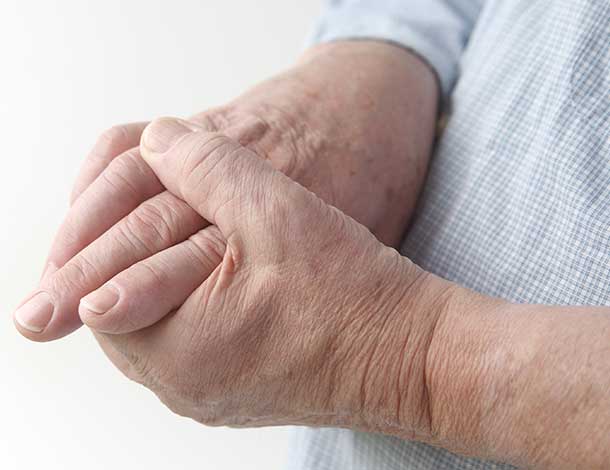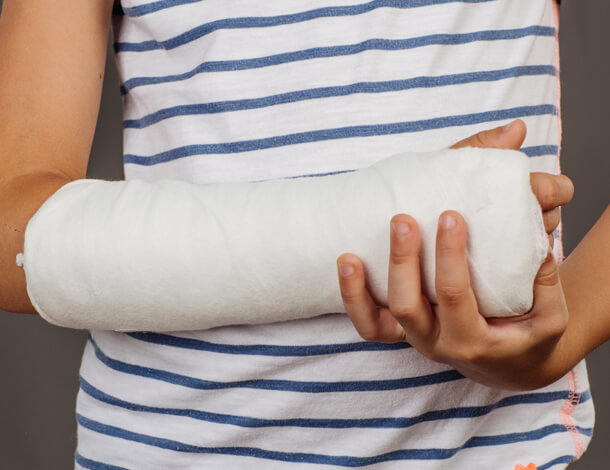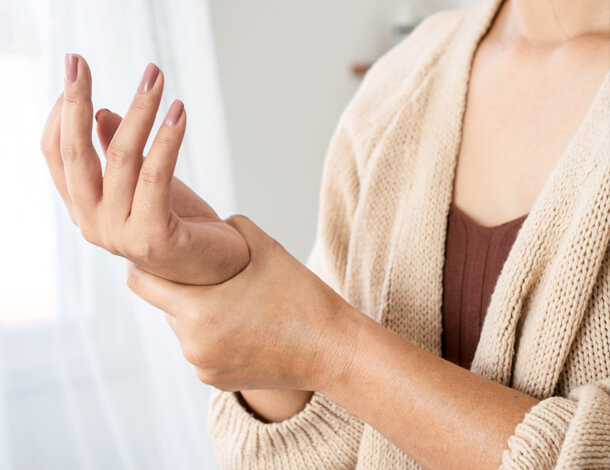Feeling Hand Stiffness? One of These Conditions Could Be to Blame

Lifting your coffee mug to take a sip in the morning, typing an email, waving at a neighbor … your hands work hard every day so you can live a full life. But hand stiffness—especially if accompanied by pain—can make activities difficult that you used to take for granted.
Read on to learn about the conditions and injuries that can cause hand stiffness. Know what other symptoms to watch out for and determine which treatments are available to provide relief.
Hand Conditions That Cause Stiffness
If you’re feeling frequent or ongoing hand stiffness, one of these common conditions of the hand could be a potential cause:
- Stenosing Tenosynovitis (Trigger Finger)
- Osteoarthritis
- Rheumatoid Arthritis
- Psoriatic Arthritis
- Dupuytren’s Contracture
- Fractures
- Dislocations
- Sprains
Trigger Finger
Trigger finger, or stenosing tenosynovitis, is a common condition that causes pain and a snapping or locking (“triggering”) of the fingers or thumb. Along with hand stiffness, it usually presents with pain.
Stenosing tenosynovitis is typically the result of prolonged grasping or weight bearing on the hand, like when using a cane or hand tools. It can also occur due to an underlying condition like rheumatoid arthritis, diabetes, or carpal tunnel syndrome.
Hand Arthritis
Hand arthritis is a common cause of hand stiffness and pain. Early symptoms of arthritis of the hand include joint pain, a deep ache sometimes characterized as a burning sensation, and decreased functionality of the hand or wrist.
There are three types of hand arthritis typically responsible for stiffness:
- Osteoarthritis. According to the Centers for Disease Control and Prevention, osteoarthritis is the most common type of arthritis. It’s often referred to as degenerative or “wear and tear” arthritis, as cartilage breaks down and wears away. This leads to your hand bones rubbing together, causing inflammation, pain, and loss of movement.
- Rheumatoid Arthritis (RA). Another type of hand arthritis and a potential cause of hand stiffness is rheumatoid arthritis. RA is a chronic inflammatory disease that causes the lining of your joints to swell, leading to pain, inflexibility, cartilage loss, and loss of movement.
- Psoriatic Arthritis (PsA). PsA causes joint pain and swelling with skin inflammation and scaly patches (psoriasis). The finger joints are commonly affected
As hand arthritis progresses, you may experience increased stiffness and pain, some loss of movement in your hands, or it may become difficult to open and close your hands.
Dupuytren’s Contracture
Dupuytren’s contracture causes a bending (“contracture”) of your fingers down into your palm and most often affects the ring finger and pinky. It occurs due to the thickening of the normal tissues under the skin of your fingers and palm.
The most common sign of this condition is a lump or nodule in your palm near the flexion crease, located at the base of your ring finger, pinky finger, or thumb. It is most often painless.
Dupuytren’s contracture is thought to be genetic, but what exactly causes it is still unknown. It’s typically mild and progresses very slowly. However, in some cases, it can cause severe stiffness in your hands that makes it difficult to straighten any of the affected fingers.
Injuries That Cause Hand Stiffness
While the above conditions are widespread causes of inflexibility, this symptom can also occur after an injury to your hand. The culprit could be inflammation, scarring, or damage to your ligaments, tendons, or bones from a fall or sports injury.
Hand injuries typically fall into four categories:
- Fractures
- Dislocations
- Sprains
- Tendon Injuries
Fractures
A hand fracture or broken hand can be caused by a fall or hard blow. While you may still be able to move your hand, you’ll likely feel pain and hand stiffness if it’s broken.
Even after treating the fracture, your hand stiffness may remain while you’re recovering, and in some cases, it never goes away entirely.
Dislocations
A dislocation in your hand occurs when a bone moves out of its normal position, usually at a joint. By definition, when a dislocation occurs, the surrounding ligaments are injured. This will cause hand stiffness that’s similar to a fracture, as well as swelling or pain.
Hand dislocation is a common sport or work-related injury, and there are three joints where most hand dislocations occur:
- Interphalangeal Joint (in the Fingers)
- Metacarpophalangeal Joint (Where the Finger Joins the Hand)
- Carpometacarpal Joint (Where Metacarpals Meet the Wrist)
Sprains
With a hand sprain, a ligament has been stretched or torn. This most commonly occurs when someone falls and lands on their hands. Along with hand stiffness, a sprain can cause bruising, pain, swelling, and weakness.
Sprains often occur in the ligaments of the proximal interphalangeal joints where the fingers bend in your hand. The ligaments of the thumb’s metacarpophalangeal (knuckle) joint can also become sprained.
Tendon Injuries
Extensor tendon injuries can happen from an accident, a sports or work-related injury, or even a deep cut on the hand. Tendons allow you to move your hands, so an injured tendon can cause hand stiffness (or make it impossible to move your hand in more severe cases).
Nerve Compression Pathologies
In addition to other signs and symptoms, a hand stiffness sensation is sometimes also caused by nerve compression syndromes, such as:
- Carpal Tunnel
- Cubital Tunnel
- Guyon’s Canal
- Radial Nerve Compression
Diagnosing the Cause of Stiffness
Prolonged hand stiffness isn’t normal, so it’s essential to see a doctor who can examine your hands and joints. In some cases, delaying treatment can result in permanent stiffness.
If the cause of your stiffness isn’t related to a known injury, a specialist may want to examine your fingers and wrist to diagnose the problem. They’ll review your medical history and might do X-rays or an MRI to identify any signs of arthritis or ligament injury.
Your doctor may also want to order some blood work to detect any conditions like RA or PsA that could be causing your hand stiffness.
Treatment Options
Depending on the type and severity of your condition or injury, different treatment options are available to help you manage symptoms and relieve stiffness in your hands.
Your doctor will likely recommend conservative treatments first. Non-drug treatments like stretching, splinting, or hot/cold therapy can often help. A hand specialist may also recommend steroid injections or anti-inflammatory medications (NSAIDs).
Request an appointment with a hand specialist
Hand Therapy
For many conditions that cause hand stiffness, therapy is often critically important. For the most optimal results and specialized care, patients with hand pain caused by stiffness should see a certified hand therapist (CHT) instead of a general physical therapist (PT) or occupational therapist (OT).
Learn about hand therapy from IHTSC
Hand Surgery
If the above treatments don’t help, your doctor may recommend surgery. Surgical procedures to relieve hand stiffness and pain include:
- Artery Repair (if Stiffness Is Due to Vascular Problems)
- Arthritis Surgery
- Carpal Tunnel Release
- Cubital Tunnel Release
- Contracture Release
- Fracture Care
- Fracture Fixation
- Joint Fusion
- Joint Replacement
- Mass Excision
- Nerve Repair
- Nerve Transfer
- Tendon Repair
- Tendon Transfer
- Tendonitis Release
- Thumb Replacement Surgery
- Trapeziectomy
- Trigger Finger Release
Trust the Hand Experts at IHTSC
For over 50 years, Indiana Hand to Shoulder Center has provided complete care for hand, wrist, elbow, and shoulder injuries, disorders, and conditions.
If you’ve been dealing with hand stiffness or pain, IHTSC’s experienced team of hand surgeons, advanced practice providers, and prominent hand therapists can help.
To schedule by phone, call us at (317) 751-5904. Or, request an appointment online.

You Might Also Like:
Disclaimer: The materials on this website have been prepared for informational purposes only and do not constitute advice. You should not act or rely upon any medical information on this website without a physician’s advice. The information contained within this website is not intended to serve as a substitution for a thorough examination from a qualified healthcare provider. The display of this information is not intended to create a health care provider-patient relationship between the Indiana Hand to Shoulder Center and you.



